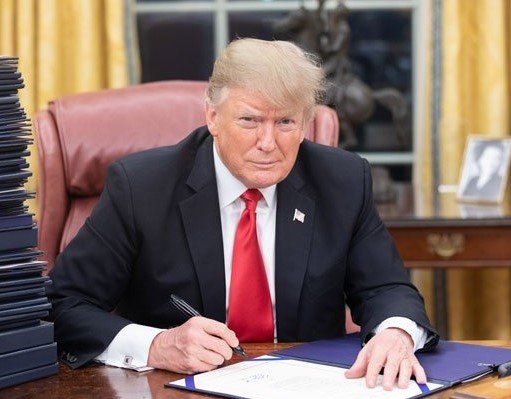Trade Tensions Escalate as U.S. Moves Forward with Tariffs
President Donald Trump is set to impose a sweeping 25% tariff on all steel and aluminum imports, including those from Canada and Mexico, marking another significant escalation in trade policy. The move, which he will formally announce on Monday, is expected to trigger global reactions and potential countermeasures from affected nations.
Speaking to reporters aboard Air Force One on Sunday, Trump made it clear that no country would be exempt from the tariff. “Any steel coming into the United States is going to have a 25% tariff,” he stated. When asked whether aluminum would be included, he confirmed, “Aluminum, too.”
Reciprocal Tariffs on the Horizon
Trump also signaled that additional trade penalties are coming. He mentioned plans to announce “reciprocal tariffs” as early as Tuesday or Wednesday. This means the U.S. will impose duties on products from nations that have tariffs on American goods.
This move suggests a broader trade strategy aimed at pressuring other economies into reducing their trade barriers. The administration has long argued that existing trade deals put American manufacturers at a disadvantage, and these new tariffs are positioned as a corrective measure.

Impacts on Global Markets and Industry
The news of these tariffs is likely to send shockwaves through global markets. Steel and aluminum producers in the U.S. may benefit from reduced competition, but companies reliant on imported raw materials—such as auto manufacturers and beverage companies—could face rising costs.
- Domestic manufacturers that use steel and aluminum in production may pass higher costs onto consumers.
- Retaliatory tariffs from affected countries could impact American exports, particularly agricultural goods.
- Financial markets may react with volatility as investors assess the potential economic fallout.
While Trump has long championed protectionist policies, critics argue that these tariffs could do more harm than good, straining diplomatic relations and increasing prices for American consumers.
Canada, Mexico, and Other Trading Partners Brace for Fallout
Canada and Mexico, both key trading partners of the U.S., are among the countries expected to be hardest hit. The two nations, along with the U.S., are part of the United States-Mexico-Canada Agreement (USMCA), a trade deal that was supposed to stabilize North American trade.
Other major exporters of steel and aluminum to the U.S., such as China, Japan, and the European Union, may also retaliate. In previous tariff disputes, these countries have targeted American agricultural products, aircraft, and whiskey.
What Happens Next?
With Trump confirming that further trade measures are on the way, businesses and policymakers will be watching closely for the next steps. Markets will likely react on Monday as investors gauge the broader implications of these tariffs.
For now, industries that rely on steel and aluminum imports face uncertainty, while global trade partners weigh their response to this latest escalation. The coming days will determine just how far-reaching the effects of Trump’s tariff plan will be.
